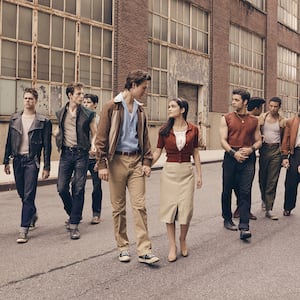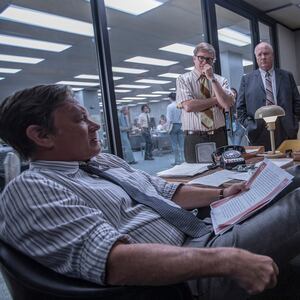With Steven Spielberg’s movie memoir The Fabelmans expanding in theaters this holiday weekend, people are talking—as they always do with Spielberg movies—about what gold statues it might win. A fictionalized version of Spielberg’s youth as an amateur movie maker with complicated parents, the film has been earning raves for its performances. Key among them are Michelle Williams as Spielberg’s mother and Judd Hirsch in a brief but barnburning performance as an eccentric uncle.
Williams’ four previous Oscar nominations give her the status that could make her a frontrunner in the Best Actress race, while Hirsch could make an Oscar return more than 40 years after his first Supporting Actor nomination for Ordinary People. Paul Dano as the Spielberg patriarch, and breakthrough Gabriel LaBelle as the director’s avatar, may also be recognized.

But it is also worth noting that the Academy has honored Spielberg’s actors less than you might think, given the amount of beloved films he has made, and the talent he fills them with. Should The Fabelmans earn multiple acting nominations, it will be only the fourth Spielberg film to do so. Some of the finest performances in Spielberg films went without an Oscar nomination, like Harrison Ford as Indiana Jones or Robert Shaw in Jaws.
In total, Spielberg has only directed 15 performances to an Oscar nomination. Shockingly, only three of them have won, and all within the past decade. While none of the 15 represent a what-were-they-thinking nomination, here’s a ranking of all of these performances from good to greatest…
15. Anthony Hopkins - Amistad
Hopkins was in his presidential era, turning in this performance as sixth American president John Quincy Adams only two years after being nominated for playing Richard Nixon in Oliver Stone’s biopic. Safely the broadest performance in this lineup, Hopkins puts on a rascally ol’ codger voice and delivers massive monologues with the kind of scenery-devouring gravitas he’s known for. It’s such blatant Oscar catnip as to be brand certified.
14. Tom Hanks - Saving Private Ryan

Hanks and Spielberg’s sensibilities are so aligned that we probably take their long creative partnership for granted (though surprisingly this was their first collaboration), and maybe I’m falling prey to the same thing here. But Hanks’ performance is somewhat of an embodiment of the qualities the film’s detractors have questioned: ill-fitting sentimentality opposite the film’s grim war-set realities. Hanks has never been less than charismatic and convincing, and while he is the heart of this massive ensemble, the sogginess here keeps him from the top of the heap.
13. Melinda Dillon - Close Encounters of the Third Kind
This is one of the nominations that many would cast aside quickly, due to Dillon’s underwritten and sometimes silly (shoehorning in a climactic kiss between her and Richard Dreyfuss’ protagonist? I guess!) character: a mother of a small boy abducted by benevolent aliens. But despite this, Dillon draws a clearly defined arc out of her dazed physicality: from doting terrified Everymom to catatonic nightly news fodder to wide-eyed true believer. While there’s not much at the script level, the actress still takes the character on a journey that enriches the catharsis of the film.
12. Liam Neeson - Schindler’s List
There is a lot of purposeful, necessary restraint to Neeson’s performance as the eponymous man whose factories helped rescue hundreds of Jewish people during the Holocaust. Like Oskar Schindler’s slow-building awareness of his own self-interest and how much more he could have done, Neeson often plays passive observer to the film around him, but doesn’t come fully into focus until the film’s final emotional climax. It’s the kind of delicate, oft-overlooked performance that you would want to jockey for in a ranking like this—and remains Neeson’s only nomination—but Neeson doesn’t fully allow us inside the enigma.
11. Ariana Debose - West Side Story

West Side Story’s Anita is a role destined to win actresses awards, and Debose admirably lives up to that legacy. Debose delivers on Anita’s passion—from the euphoric highs of “America” to the rebelliousness of the tragic lie she tells when she exits the film—if without much spontaneity or surprise beyond what we expect.
10. Mark Rylance - Bridge of Spies
After winning Best Supporting Actor here as a dignified Russian spy, Rylance would upend the acute and investing minimalism of this performance with everything-but-the-kitchen-sink, try-hard idiosyncrasies as weirdos in films like Don’t Look Up and Spielberg’s Ready Player One. Please, we are begging you, give us this Rylance again.
9. Tommy Lee Jones - Lincoln
Probably no one in this sprawling ensemble savors the philosophical and elocutionary opulence of Tony Kushner’s script as much as Tommy Lee Jones. While the film stages Jones’ portrayal of congressman Thaddeus Stevens as the film’s surprise strategic hero—and his work is emotionally rooted throughout—the triumph here is Jones once again taking the reins of a character and giving us the full tilt of his irascible, sarcastic pain-in-the-ass, undeniably lovable screen persona.
8. Meryl Streep - The Post

As Washington Post publisher Katharine Graham, Oscar’s most nominated actress is such a ball of fidgety nerves that it’s almost like she is performing Debbie Reynolds’ hands-forward impersonation of Streep. The tension of Spielberg’s Pentagon Papers film turns on a dime with every questioning gesture Streep makes in male-dominated board rooms, bringing massive crowd-swelling catharsis once she finally makes big moves to claim her power. Streep’s ability to reveal Graham’s inner life as much through inaction as action is further proof of why she is the reigning best. Plus, the caftans? Come on.
7. Christopher Walken - Catch Me If You Can
Around the turn of the century, Walken had reconfigured his screen persona to that of an unexpected oddball debonair, thanks in part to his dance skills on display in Fatboy Slim’s “Weapon of Choice” music video. Here he is the sad flipside of that coin, playing a midcentury man who uses his charm as an evasive veneer for his shortcomings—until it no longer works. Walken subverts his own image to wholly surprising emotional effect. It’s one of the briefest performances on this list, but unlike some of the others, you can still feel his painful presence when he is gone.
6. Sally Field - Lincoln
Field always gives her full body and soul, and here she brings the pains and agonies of first lady Mary Todd Lincoln to the heights of Shakespearean tragedy. But Field’s real powerhouse scene is her faux-polite dressing down of Jones’ Stevens, offhandedly battering his ego as if she were fanning a fly. Few performers can wield blows as fatal (whether delicately or with the force of a battering ram) as Field, and here she gave the level of rigorous psychological detail that is the signature of her best performances.
5. Oprah Winfrey - The Color Purple
Winfrey arrived on movie screens as Sofia with the kind of fireworks that make it difficult to decide which is more confounding: that it was her debut performance or that she would return to acting only on rare occasions. Winfrey enters the film with a fully formed character in Sofia’s self-assuredness; what’s miraculous in the performance is the journey to hell and back again, with Winfrey embodying the spirit being taken out of her and its triumphant recovery.
4. Daniel Day-Lewis - Lincoln

Can you believe it took until 2012 for someone to win an acting Oscar for a Spielberg movie? And all it took was the most revered actor of our time playing the most significant American president during the most consequential moment of his tenure. In turn, Day-Lewis delivered a performance more complicated than you might expect, but as physically and emotionally grounded as only he can. His frame at once towering and frail, his voice somewhere between the soft purr of an ancient house cat and the creaking floorboards of a haunted house, his Lincoln was beleaguered and contradictory with an emotional immediacy that brushed off any historical biopic dust.
3. Margaret Avery - The Color Purple
As the traveling singer Shug Avery, Margaret Avery has to embody both the idolized version of the chanteuse and the deeply longing woman beneath the rhinestones. When she takes the stage, she’s a ferociously dynamic screen presence (enough so that you don’t mind that Avery is lipsynching). And when she’s out of the limelight, the actress reveals layers of internalized regret over her estranged relationship with her preacher father. Avery powerfully brings both versions of Shug into one in the iconic “Maybe God Is Tryin’ to Tell You Somethin’” scene, with her vulnerability giving the film one of its greatest emotional climaxes of many.
2. Ralph Fiennes - Schindler’s List
Playing Nazi lieutenant Amon Goeth, Fiennes takes what could have been a stock portraiture of pure evil and fills him with complications that ultimately make him more terrifying. Instead of mustache-twirling villainy, Fiennes shows his cruelty as imbued with equal parts calculation and randomness, moving through sexuality, petulance, indifference, and flaccid stabs at power. You’re constantly on edge watching him, never knowing in what form his evil will strike. It’s fitting that there is not another performance quite like it in any other Spielberg film, given Schindler’s List’s place of significance in his filmography. Fiennes was then relatively unknown as a movie actor, but with this one performance he immediately carved out a screen persona that would stay just as unpredictable, even if he still shockingly has no Oscar.
1. Whoopi Goldberg - The Color Purple

Not only the best Spielberg performance to be nominated by the Academy, Goldberg’s star-making turn as Celie Johnson might be the greatest performance in any Spielberg film, full-stop. Whoopi had already made a name for herself as master of transformation with her one-woman Broadway show by the time she was cast. She solidified that reputation in the film, not only playing Celie aging across decades, but enhancing the film’s power with her physical precision and emotional depth, taking us through every small step of Celie’s journey toward self-actualization. The performance is an enduringly emotional high-wire act, a seemingly impossible feat of transforming a woman’s spirit before our eyes—the stuff of indelible movie magic.








